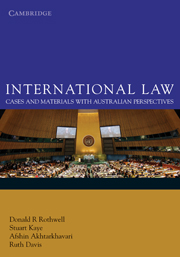Book contents
- Frontmatter
- Contents
- Preface
- About the authors
- Acknowledgements
- Table of cases
- Table of statutes
- Table of treaties and other international instruments
- Abbreviations
- 1 The nature of international law
- 2 Sources of international law
- 3 Law of treaties
- 4 International and municipal law
- 5 International legal personality
- 6 Sovereignty over territory
- 7 Jurisdiction
- 8 State responsibility
- 9 Human rights
- 10 Law of the sea
- 11 International environmental law
- 12 Enforcement of international law
- 13 The peaceful settlement of international disputes
- Index
- References
7 - Jurisdiction
- Frontmatter
- Contents
- Preface
- About the authors
- Acknowledgements
- Table of cases
- Table of statutes
- Table of treaties and other international instruments
- Abbreviations
- 1 The nature of international law
- 2 Sources of international law
- 3 Law of treaties
- 4 International and municipal law
- 5 International legal personality
- 6 Sovereignty over territory
- 7 Jurisdiction
- 8 State responsibility
- 9 Human rights
- 10 Law of the sea
- 11 International environmental law
- 12 Enforcement of international law
- 13 The peaceful settlement of international disputes
- Index
- References
Summary
Introduction
Jurisdiction refers to the ability of a State to make and enforce its laws. While often related to sovereignty, and intrinsically linked to its territory, jurisdiction can exist without a connection to territory. Jurisdiction can be held to exist in a variety of contexts, depending on the location of events, the nationality of participants or the surrounding circumstances, and will also indicate whether a State may be able to undertake enforcement action to uphold its law. This chapter will consider the nature of jurisdiction insofar as it affects persons, corporations, ships and aircraft, as well as the question of when States may seek to validly enforce their laws.
Types of jurisdiction
All types of jurisdiction may be divided into two basic types: prescriptive jurisdiction and enforcement jurisdiction. Prescriptive jurisdiction is the power to regulate an activity, and to prescribe certain behaviour. That is to say, prescriptive jurisdiction is the ability to make laws that can validly purport to regulate people and situations, regardless of their location. Enforcement jurisdiction is the ability of a State to validly enforce its law, through the exercise of executive and judicial power. That is, it is the legal validity of a State to arrest, try, convict and gaol an individual for a breach of its laws.
Jurisdiction can be further broken down into categories, based on territory, nationality, the nature of the act in issue, and possibly even the nationality of the victim.
- Type
- Chapter
- Information
- International LawCases and Materials with Australian Perspectives, pp. 294 - 377Publisher: Cambridge University PressPrint publication year: 2010



